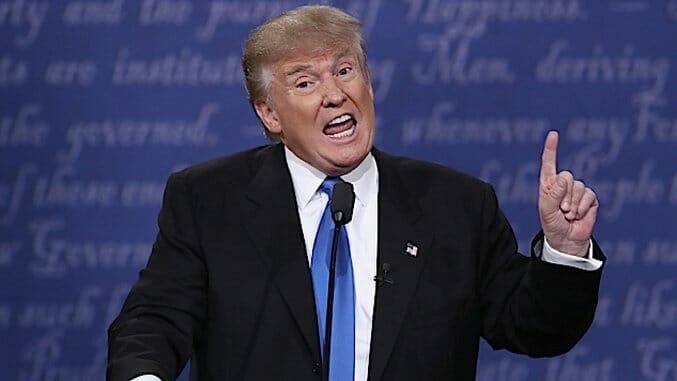Here Are Just a Few of Trump’s Glaring Conflicts of Interest With Banks, Hotels, Etc.
Photo courtesy of Getty
On Nov. 30, Donald Trump took to his favorite medium and tweeted that on Thursday night, Dec. 15, he would give a speech that would put to rest all fears over his myriad financial conflicts: his debts, his investments, his plans for both. Perhaps he would even explain the fact that he and his kids don’t seem to know what a blind trust means—finally we would have an explanation.
Well, early yesterday, the Trump camp announced that this grand reveal would be postponed for a month, presumably to give the Orange Wizard of Oz and his flying monkeys more time behind the curtain. Donald Trump faces a far more complex transition than any president before him in terms of his holdings, and they’re made all the more complicated by the fact that his assets have been built using tactics like tax shelters, loans and banking rules only available to the wealthiest humans on Earth—which is all the more reason this latest delay in any kind of explanation is unacceptable. Of all the back talk and contradicting himself Trump has done these past two years, nothing about the man has been more shrouded in secrecy than his financials, which is ironic considering it was touted as one of his main “strengths” during his long and tumultuous campaign. The need for clarity doesn’t stop with what he’ll do with his many holdings and investments around the world, The more pertinent questions might be to whom around the world Donald Trump—who has proudly called himself “the king of debt” —owes his ocean of debt to, and what will happen to that debt when he takes office.
I will be holding a major news conference in New York City with my children on December 15 to discuss the fact that I will be leaving my …
— Donald J. Trump (@realDonaldTrump) November 30, 2016
great business in total in order to fully focus on running the country in order to MAKE AMERICA GREAT AGAIN! While I am not mandated to ….
— Donald J. Trump (@realDonaldTrump) November 30, 2016
do this under the law, I feel it is visually important, as President, to in no way have a conflict of interest with my various businesses..
— Donald J. Trump (@realDonaldTrump) November 30, 2016
-

-

-

-

-

-

-

-

-

-

-

-

-

-

-

-

-

-

-

-

-

-

-

-

-

-

-

-

-

-

-

-

-

-

-

-

-

-

-

-








































